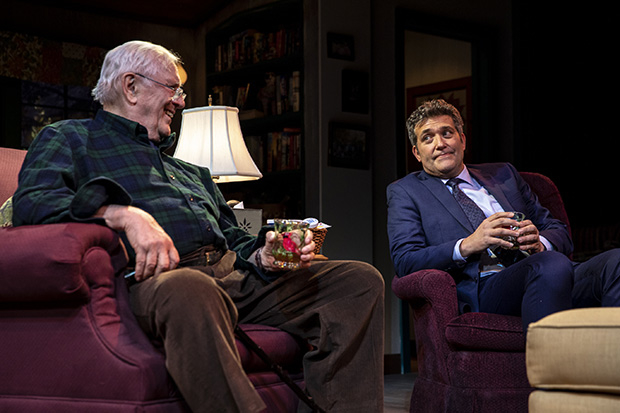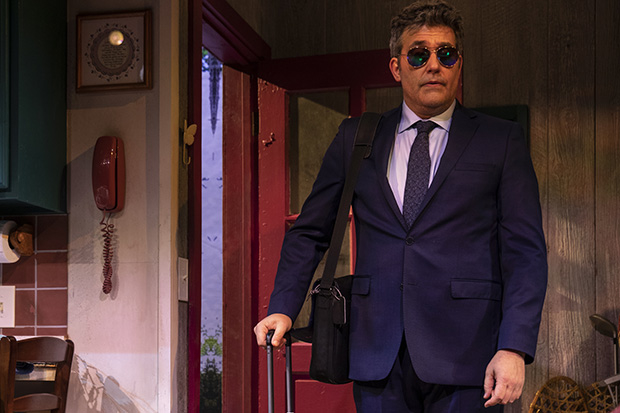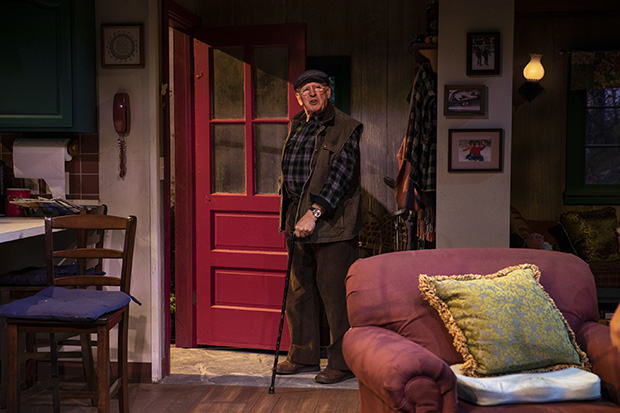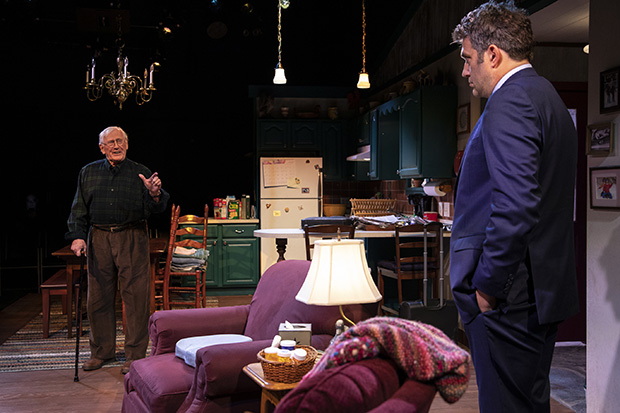A Son and His Elderly Father Have "The Talk" in Harry Townsend's Last Stand
Len Cariou and Craig Bierko star in George Eastman’s new play.

(© Maria Baranova)
In George Eastman's Harry Townsend's Last Stand, an 84-year-old man imparts to his son an adult version of the "facts of life" — advice that puts an inordinate focus on flatulence and nostril hair. Remarkably, this is not the most important item addressed in this two-hour dramedy, now making a wobbly if heartfelt New York debut at New York City Center Stage II. Rather, "the talk" of greatest importance is one from son to father, and it's about moving dad into a retirement home.
Harry Townsend (played by Broadway legend Len Cariou) is a local celebrity in his small Vermont town, having built a reputation over several decades in radio as "The Voice of the Valley." Now retired and widowed, he still resides in his longtime home. An adult daughter, Sarah, visits him every day, but she and her brother, Alan (Craig Bierko), want to find a place where Harry will be looked after around the clock. He is increasingly forgetful and unsteady on his feet. Matters become more urgent as Sarah considers a move out of state. Alan flies in from California to broach the subject with dad.

(© Maria Baranova)
That's no spoiler. Even though he approaches this sensitive topic gingerly, we discern Alan's purpose from his earliest appearance; and anyone who has gone through a similar situation with an elderly relative will recognize the familiar motions. This leaves Eastman ample space to establish an idiosyncratic father-son relationship held together by memories and wisecracks. When Alan asks Harry how he managed to fall asleep while vacuuming, Harry responds, "If I wake up inside the Electrolux bag, I'll give you a call."
Under the sitcom-like direction of Karen Carpenter, Bierko tees up these exchanges like a caddy of comedy, telegraphing his unspoken commentary to the audience through his expressive eyebrows. He's the Burns to Cariou's Allen, and he plays the role excellently.

(© Maria Baranova)
Armed with the voice of an old broadcaster and the irrepressible smile earned from a life well-lived, Cariou easily fits into the role of Harry. Perhaps in response to the sitcom patter of Eastman's writing, costume designer David C. Woolard dresses him like Martin Crane on Frasier.
Cariou seems to be genuinely struggling to remember his lines, leaving strange rests in Eastman's comedic rhythm. It's uncomfortable to watch, but it works dramatically in this story about a charming and vigorous man who is loath to admit that he is losing some of his abilities. Several times throughout the play he calls out for Sarah, only to be reminded that she is away. He also speaks of his late wife as if she was napping in the next room — and perhaps, in a way, she is.
Lauren Helpern's set is an overstuffed human habitat brimming with evidence of a fruitful life, with books and board games bulging out of every available storage space. "His" and "her" armchairs sit side by side in front of an ancient television set, offering evidence of the continuing spiritual presence of the family matriarch. Lighting designer Jeff Davis endows this space with a warm glow, and a final sound cue from John Gromada emphasizes the surrounding natural beauty. It seems like a lovely place to live, and anyone would be reluctant to say goodbye.

(© Maria Baranova)
Of course, there are worse fates: The Townsends come from a class of Americans that can afford $5,000-a-month room and board at a ritzy retirement community with an onsite salon and cocktail bar. In a time when many seniors must become Medicaid-qualified to even consider entry into far less glamorous homes, the material stakes of this situation feel quite low, even if the actors do a fine job selling the emotional stakes.
But as an onstage public service announcement, Harry Townsend's Last Stand is thoughtful and often quite funny. With so many Americans approaching or past the age of retirement, this is a play that will instantly feel relatable to a large swathe of the audience. Expect to see more productions at theaters across the country.









